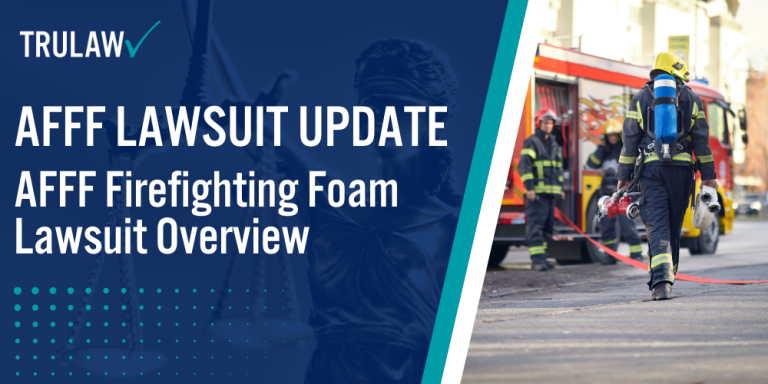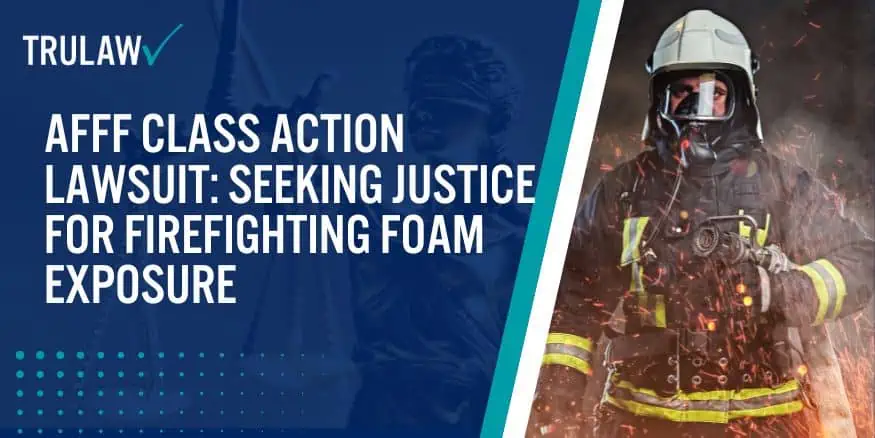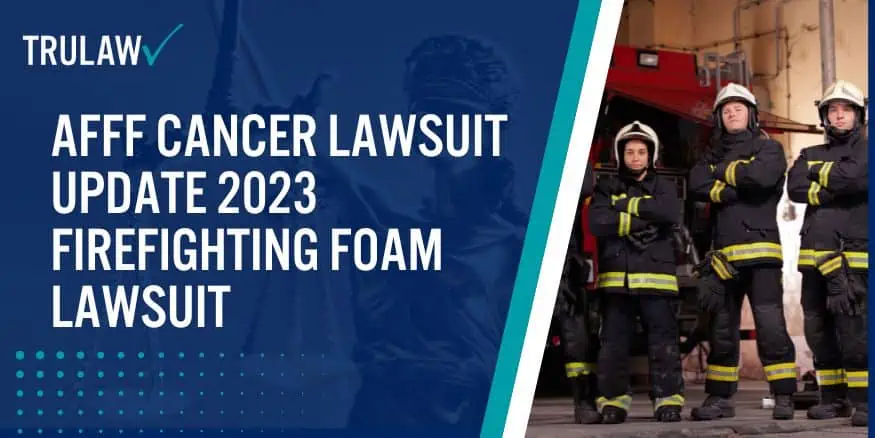AFFF Liver Cancer Lawsuit
- Last Updated: July 9th, 2024

Attorney Jessie Paluch, founder of TruLaw, has over 25 years of experience as a personal injury and mass tort attorney, and previously worked as an international tax attorney at Deloitte. Jessie collaborates with attorneys nationwide — enabling her to share reliable, up-to-date legal information with our readers.
Legally Reviewed
This article has been written and reviewed for legal accuracy and clarity by the team of writers and legal experts at TruLaw and is as accurate as possible. This content should not be taken as legal advice from an attorney. If you would like to learn more about our owner and experienced injury lawyer, Jessie Paluch, you can do so here.
Fact-Checked
TruLaw does everything possible to make sure the information in this article is up to date and accurate. If you need specific legal advice about your case, contact us by using the chat on the bottom of this page. This article should not be taken as advice from an attorney.
Key takeaways:
- AFFF, or firefighting foam, contains toxic PFAS chemicals linked to liver cancer in firefighters and military personnel.
- Victims exposed to these hazardous substances are consulting with specialized lawyers for potential compensation through lawsuits.
- Research highlights the risks of PFAS exposure, showing a significant increase in liver cancer cases among those who've used AFFF frequently.
Overview of the AFFF Liver Cancer Lawsuit
On this page, we’ll provide an overview of AFFF liver cancer lawsuit, potential AFFF Liver Cancer Lawsuit settlement values, who qualifies to file an AFFF liver cancer lawsuit, and much more.
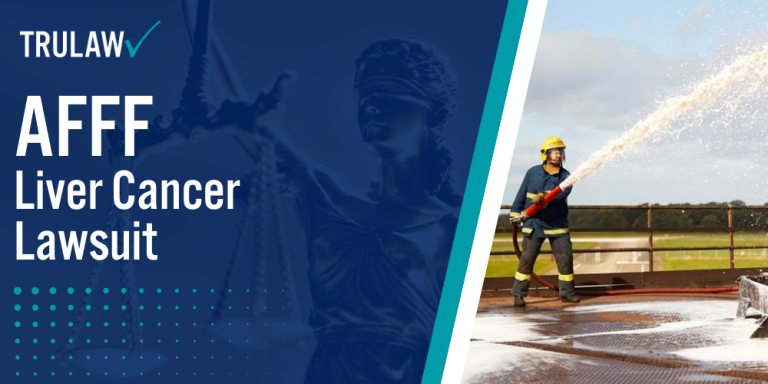
Intro to the AFFF Liver Cancer Lawsuit
Allegations in the AFFF liver cancer lawsuit include, but are not limited to:
- Toxic Exposure: Plaintiffs contend their liver cancer resulted from the accumulation of forever chemicals after using or being in contact with AFFF.
- Health Risks: The lawsuits point to studies showing that the substances in AFFF are carcinogenic and may increase the risk of liver cancer, among other illnesses.
- Negligence and Liability: AFFF manufacturers are accused of knowing about the risks, failing to warn users, and continuing to sell hazardous products.
If you’ve suffered from liver cancer after exposure to AFFF, you may be eligible to take legal action.
Contact TruLaw using the chat on this page to find out if you qualify to file an AFFF liver cancer claim.
Table of Contents
AFFF Exposure and Liver Cancer
Exposure to AFFF firefighting foam has been increasingly linked to serious health risks, including liver cancer, as legal actions mount against manufacturers.
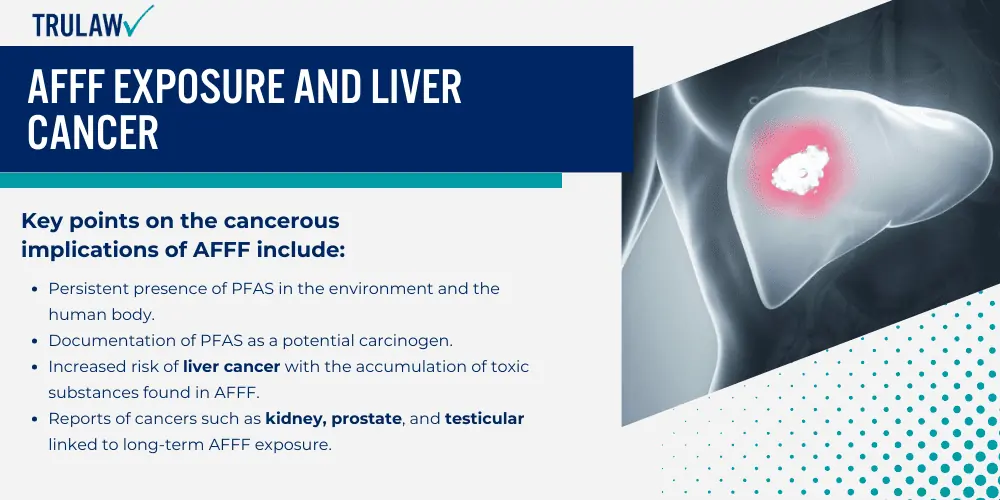
Link Between AFFF and Cancer
Research indicates a connection between AFFF exposure and cancer, particularly liver cancer.
AFFF contains substances like PFAS, which can accumulate in the body and have carcinogenic properties.
These chemicals have been associated not only with liver cancer but also with kidney cancer, prostate cancer, and testicular cancer.
Evidence suggests that these persistent chemicals may disrupt endocrine function and lead to the development of thyroid disease.
Key points on the cancerous implications of AFFF include:
- Persistent presence of PFAS in the environment and the human body.
- Documentation of PFAS as a potential carcinogen.
- Increased risk of liver cancer with the accumulation of toxic substances found in AFFF.
- Reports of cancers such as kidney, prostate, and testicular linked to long-term AFFF exposure.
Occupational Exposure and Health Risks: AFFF Foam
Individuals in certain occupations are particularly at risk for health issues due to AFFF exposure.
Firefighters, military personnel, and airport workers frequently come into contact with AFFF during their duties.
Major risk factors for these occupational groups include:
- Direct inhalation or skin contact with AFFF during firefighting activities.
- Regular exposure to training exercises at military facilities and airports.
- Potential contamination of personal protective equipment with AFFF.
- Long-term accumulation of PFAS in the body leads to chronic health conditions.
These work-related exposures have prompted numerous AFFF foam lawsuits, where affected individuals allege that their liver cancer diagnoses were a direct result of AFFF contact.
History of the AFFF Firefighting Lawsuits
The AFFF firefighting lawsuits reflect the sophisticated legal and regulatory landscape impacted by evolving scientific understanding and litigation outcomes.
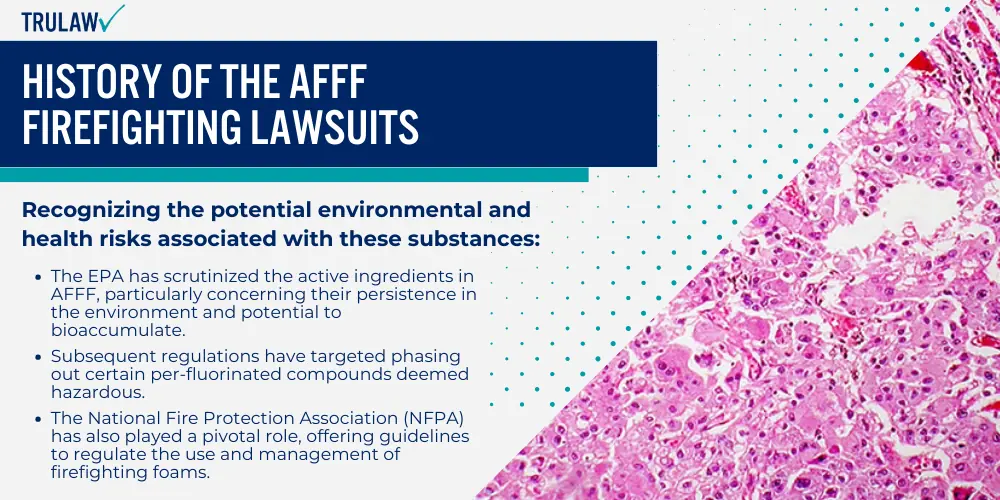
National Regulations and Chemical Classification
The Environmental Protection Agency (EPA) has been instrumental in classifying the chemicals involved in AFFF (Aqueous Film-Forming Foam).
Recognizing the potential environmental and health risks associated with these substances:
- The EPA has scrutinized the active ingredients in AFFF, particularly concerning their persistence in the environment and potential to bioaccumulate.
- Subsequent regulations have targeted phasing out certain per-fluorinated compounds deemed hazardous.
- The National Fire Protection Association (NFPA) has also played a pivotal role, offering guidelines to regulate the use and management of firefighting foams.
- These efforts have culminated in reforming firefighting foams to eliminate or reduce harmful substances.
Current Status of AFFF Litigation
The AFFF liver cancer lawsuit is a notable case involving multiple lawsuits that have been consolidated into multidistrict litigation (MDL) due to the widespread impact of AFFF exposure and the alleged failure of manufacturers to warn about the potential risks.
AFFF litigation has several key developments to date:
- Multiple lawsuits have been consolidated into a multidistrict litigation (MDL) to streamline the complex process.
- As per recent updates, the number of plaintiffs involved has grown significantly, indicating the widespread impact of AFFF exposure.
- Among the lawsuits’ allegations, liver cancer and other severe health conditions are cited as resulting from exposure to the foam’s toxic ingredients.
- AFFF manufacturers face scrutiny over their alleged failure to warn about the potential risks and the purported persistence of these chemicals in the environment.
If you’ve suffered from liver cancer after exposure to AFFF, you may be eligible to take legal action.
Contact TruLaw using the chat on this page to find out if you qualify to file an AFFF liver cancer claim.
AFFF Liver Cancer Lawsuit: Eligibility Criteria
Individuals exposed to Toxic Firefighting Foam and diagnosed with liver cancer may consider filing a Personal Injury Claim as part of a Cancer Lawsuit.
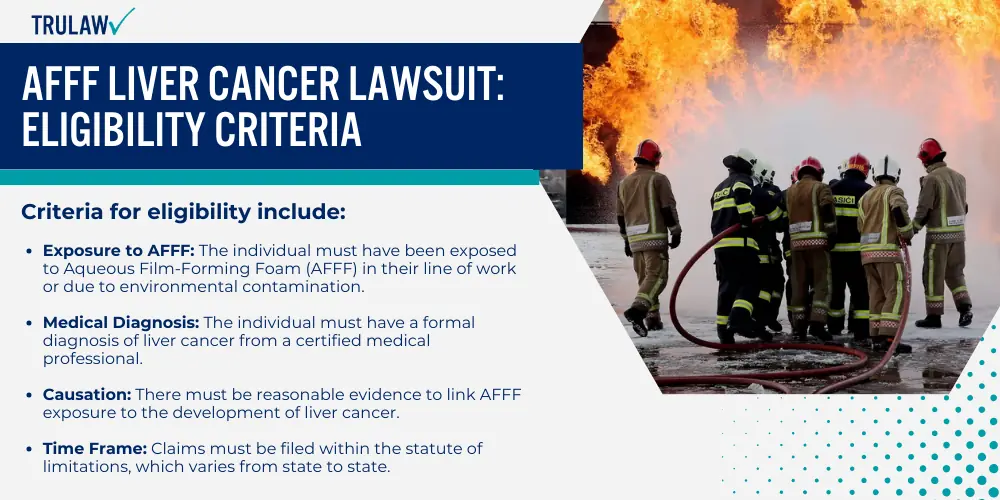
Determining Eligibility for Filing a Lawsuit
To determine if an individual qualifies to file a lawsuit related to Aqueous Film-Forming Foam (AFFF), two primary factors must be evaluated: documented exposure to AFFF and a confirmed medical diagnosis linking this exposure to adverse health effects.
These criteria are pivotal in establishing the foundation for a legal claim against entities responsible for AFFF production or use.
Criteria for eligibility include:
- Exposure to AFFF: The individual must have been exposed to Aqueous Film-Forming Foam (AFFF) in their line of work or due to environmental contamination.
- Medical Diagnosis: The individual must have a formal diagnosis of liver cancer from a certified medical professional.
- Causation: There must be reasonable evidence to link AFFF exposure to the development of liver cancer.
- Time Frame: Claims must be filed within the statute of limitations, which varies from state to state.
Steps to File an AFFF Liver Cancer Lawsuit
For those eligible, a structured process must be followed to file a lawsuit.
To initiate a successful AFFF liver cancer lawsuit, the following steps are essential:
- Documenting Exposure: Compile records that prove exposure to AFFF, including employment history and incident reports.
- Collecting Medical Records: Gather all relevant medical documentation that supports the diagnosis of liver cancer.
- Seeking Legal Counsel: Consult with an attorney who specializes in Cancer Lawsuits and toxic exposures.
- Filing the Lawsuit: Work with your attorney to file a claim against manufacturers or other entities that may be held liable for the exposure.
Multi-District Litigation: AFFF Chemical Exposure
In dealing with the complexity of AFFF litigation, the formation of a Multi-District Litigation (MDL) plays a pivotal role in streamlining cases alleging harm from AFFF chemical exposure.
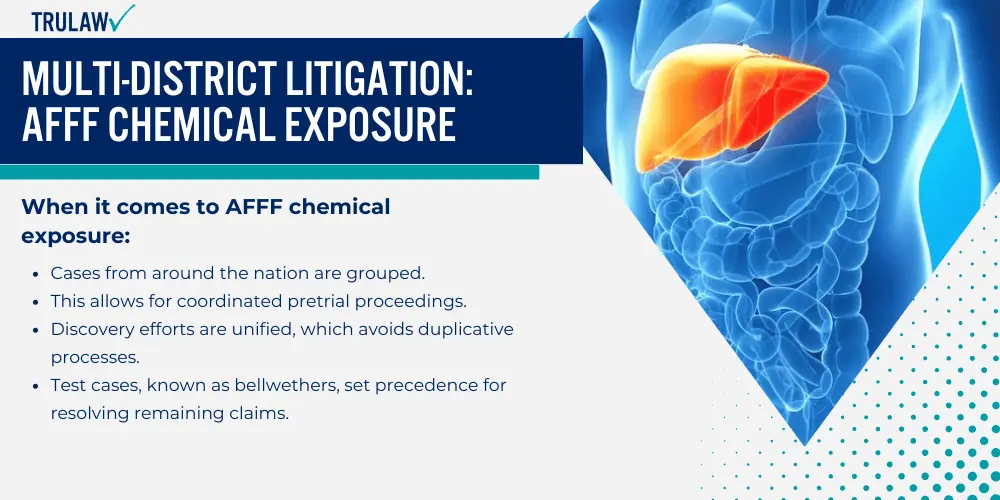
Understanding an MDL
An MDL is a legal procedure designed to consolidate similar cases to improve the efficiency of the judicial process.
When it comes to AFFF chemical exposure:
- Cases from around the nation are grouped.
- This allows for coordinated pretrial proceedings.
- Discovery efforts are unified, which avoids duplicative processes.
- Test cases, known as bellwethers, set precedence for resolving remaining claims.
By addressing AFFF lawsuits through an MDL, individuals who allege liver cancer from AFFF have their cases heard more swiftly.
Current Status of AFFF MDL Proceedings
The United States District Court has been instrumental in overseeing the AFFF MDL.
Specifically within the South Carolina Federal Court, where:
- A single judge is appointed to manage the entire AFFF MDL.
- Pretrial orders and discovery protocols are established.
- The aim is to push for settlements or prepare for trial.
If you’ve suffered from liver cancer after exposure to AFFF, you may be eligible to take legal action.
Contact TruLaw using the chat on this page to find out if you qualify to file an AFFF liver cancer claim.
Individual AFFF Cancer Lawsuits
Individuals who have developed cancer potentially linked to Aqueous Film-Forming Foams (AFFF) are pursuing justice through personal injury lawsuits.
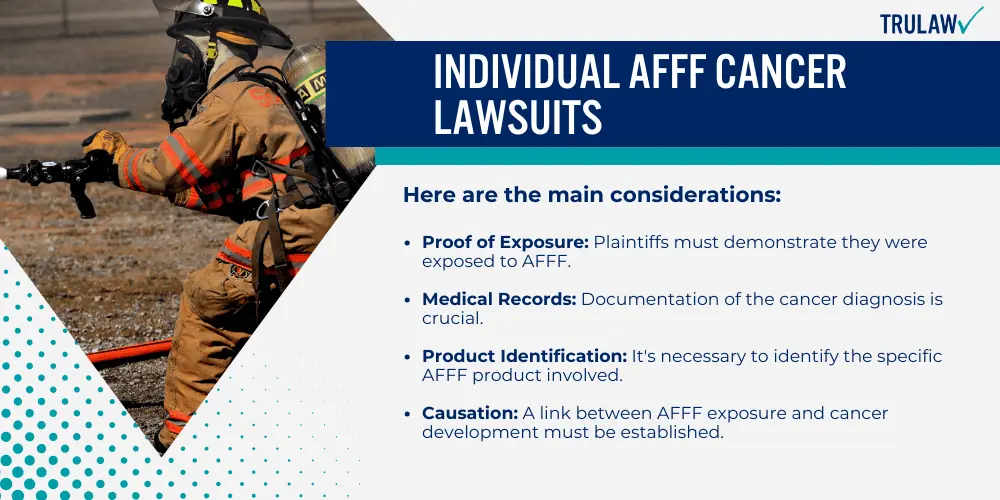
These cases highlight the serious health concerns associated with AFFF and seek to address the harm suffered by plaintiffs.
Navigating Personal Injury Cases
For those affected, navigating AFFF personal injury cases requires detailed legal knowledge.
Here are the main considerations:
- Proof of Exposure: Plaintiffs must demonstrate they were exposed to AFFF.
- Medical Records: Documentation of the cancer diagnosis is crucial.
- Product Identification: It’s necessary to identify the specific AFFF product involved.
- Causation: A link between AFFF exposure and cancer development must be established.
Differences Between Individual and Class Action Lawsuits
Individual lawsuits allow plaintiffs to claim damages unique to their circumstances.
It’s important to understand how individual lawsuits vary from class actions:
- Specific Damages: Individual lawsuits allow plaintiffs to claim damages unique to their circumstances.
- Personal Representation: Plaintiffs have their legal representation in individual cases.
- Case-by-Case Basis: Lawsuits are handled separately, providing personalized attention to each claim.
- Independent Settlements: Settlements or awards are decided individually, potentially leading to different compensation amounts.
AFFF Liver Cancer Lawsuit Settlement Values
When examining the AFFF Liver Cancer Lawsuit, understanding the potential average settlement values is crucial for plaintiffs seeking financial compensation.
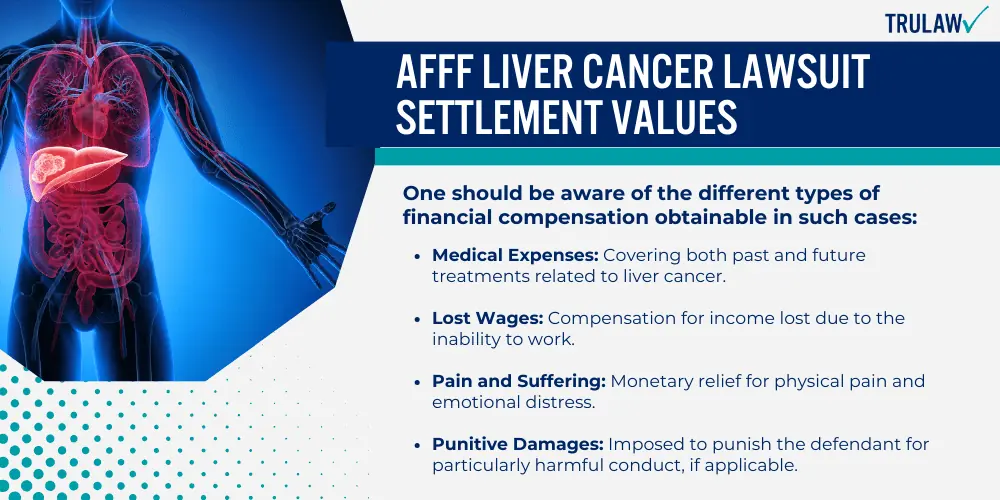
The settlement figures can vary significantly based on the merits of each case.
Types of Financial Compensation
Victims of AFFF exposure leading to liver cancer may seek various forms of financial compensation, reflecting the multifaceted impact of their illnesses.
This compensation aims to address immediate and long-term financial needs, acknowledging both the tangible and intangible harms suffered.
One should be aware of the different types of financial compensation obtainable in such cases:
- Medical Expenses: Covering both past and future treatments related to liver cancer.
- Lost Wages: Compensation for income lost due to the inability to work.
- Pain and Suffering: Monetary relief for physical pain and emotional distress.
- Punitive Damages: Imposed to punish the defendant for particularly harmful conduct, if applicable.
These categories are central to determining the overall compensation that a plaintiff may receive from an AFFF Settlement.
Major Settlements and Verdicts
The landscape of Aqueous Film-Forming Foam (AFFF) litigation is evolving, with settlements providing crucial insights into the potential outcomes of future cases.
These legal precedents not only highlight the financial implications for defendants but also underscore the significance of establishing clear evidence of harm and liability.
The AFFF firefighting foam lawsuit settlements may set a precedence for future litigations:
- Historical Outcomes: With no current benchmarks in 2024, past litigations indicate potential settlement ranges.
- Lawyer Estimations: Legal experts suggest that settlements may range from $40,000 to $300,000 or higher depending on case specifics.
- Individual Factors: The strength of the evidence, the severity of the cancer, and the impact on the plaintiff’s life greatly influence settlement values.
- MDL Consolidation: Cases often get combined into a Multi-District Litigation (MDL), streamlining the process and potentially affecting settlement figures.
These facts indicate the difficulties of predicting average settlement values for the AFFF Liver Cancer Lawsuit without considering individual case details.
Who Manufactured AFFF Foam Chemicals?
The production of Aqueous Film Forming Foam (AFFF), a toxic firefighting foam, has been predominantly associated with a few manufacturers, notably Tyco Fire Products and others, who are now facing legal challenges due to potential health risks associated with the foam.
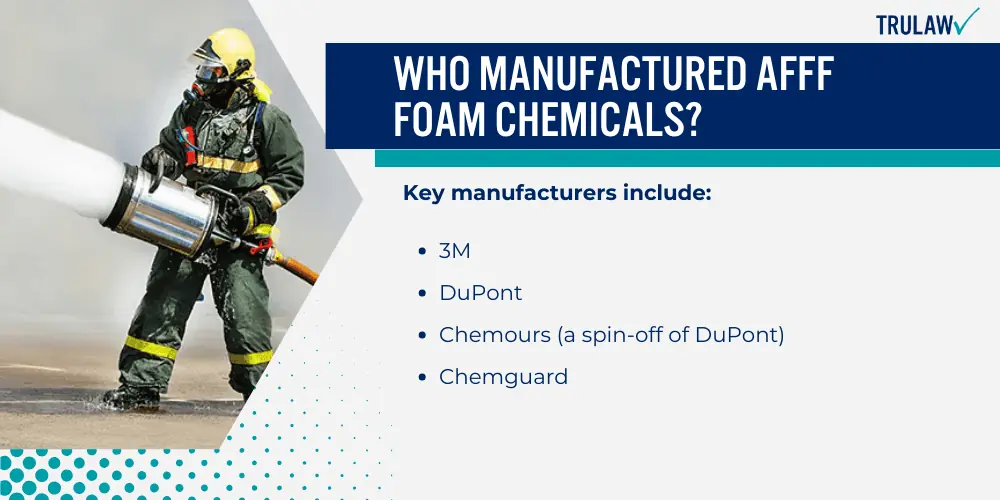
Liability and Accountability
The responsibility for producing AFFF connects to major chemical manufacturers.
AFFF manufacturers are facing numerous lawsuits alleging that they were aware of the dangers but failed to warn users.
Key manufacturers include:
- 3M
- DuPont
- Chemours (a spin-off of DuPont)
- Chemguard
Each company has been implicated in litigation for its role in producing and selling firefighting foams that contain harmful PFAS chemicals linked to various cancers, including liver cancer.
Legal Implications for AFFF Manufacturers
The litigation surrounding Aqueous Film Forming Foam (AFFF) has significant legal implications for manufacturers due to the alleged health risks associated with its PFAS (per- and polyfluoroalkyl substances) content.
The AFFF lawsuits are centered on claims that manufacturers, including prominent names like 3M and DuPont.
Key points concerning AFFF manufacturers include, but are not limited to:
- Allegations that AFFF manufacturers contributed to the harm caused by AFFF.
- Claims that AFFF manufacturers manufactured chemicals used in AFFF.
- Arguments that AFFF manufacturers knew the risks presented by these chemicals.
- Evidence presented in court regarding AFFF manufacturers’ involvement and responsibility.
Court proceedings are closely watched, as they may set a precedent for manufacturer accountability in AFFF-related lawsuits.
Finding Legal Assistance for AFFF Claims
Pursuing justice for health issues allegedly linked to Aqueous Film-Forming Foams (AFFF) requires expert legal guidance.
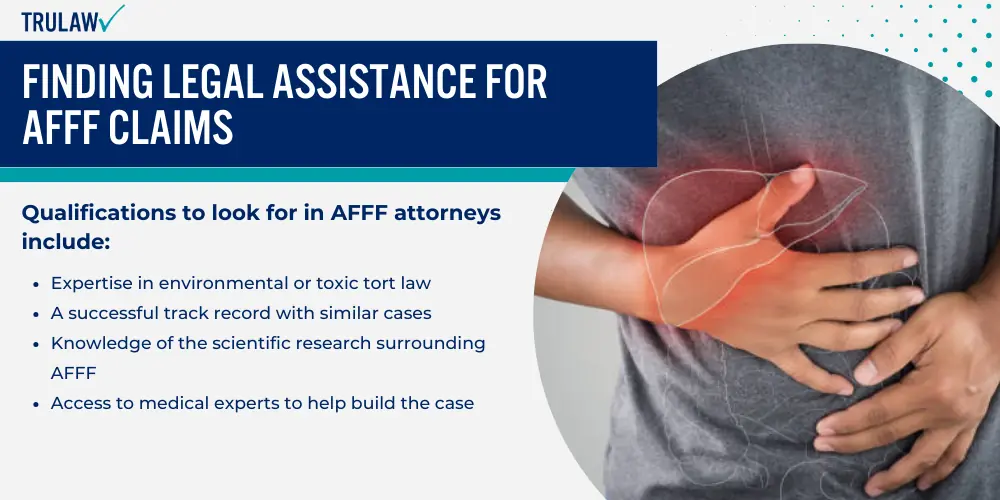
Claimants seek AFFF Lawyers and Firefighting Foam Lawyers experienced in handling complex litigation associated with exposure to this foam.
Finding Specialized Legal Representation
Those impacted by AFFF exposure should consider several factors when looking for legal representation.
Qualifications to look for in AFFF attorneys include:
- Expertise in environmental or toxic tort law
- A successful track record with similar cases
- Knowledge of the scientific research surrounding AFFF
- Access to medical experts to help build the case
An attorney’s willingness to provide free consultation is also an important consideration when assessing potential legal partners for your AFFF claim.
Consulting with AFFF Lawyers: TruLaw
TruLaw and its network of skilled lawyers provide resources and legal counsel to those affected by AFFF.
Aspects to consider when consulting with AFFF lawyers at TruLaw:
- The firm’s approach to evaluating your case
- How the firm will assist you in filing an AFFF Liver Cancer Lawsuit
- Resources they provide to understand the link between AFFF and cancer
- Their communication process and how they keep clients informed
By addressing these details, TruLaw aims to establish a strong attorney-client relationship focused on the nuances of AFFF litigation.
AFFF Chemical Foam: Impact on Public Health and Environment
The widespread use of Aqueous Film-Forming Foam (AFFF) has raised serious concerns about environmental and public health due to its content of per- and polyfluoroalkyl substances (PFAS).
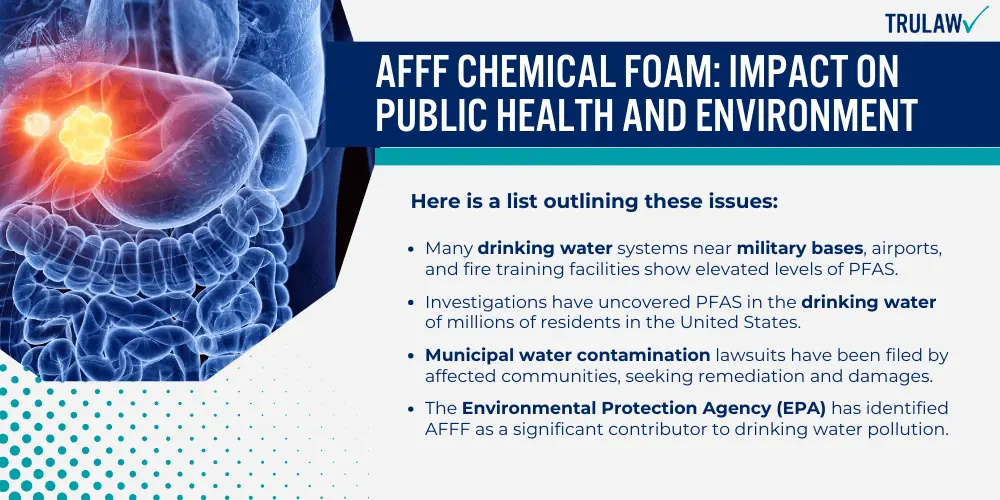
These concerns are notably centered around water contamination and the associated health risks.
AFFF Water Contamination Cases
Contamination of water sources by AFFF has led to numerous municipal water contamination cases across the country, affecting both the environment and public health.
Drinking water supplies for communities have been compromised by the infiltration of PFAS, leading to contaminated drinking water.
Here is a list outlining these issues:
- Many drinking water systems near military bases, airports, and fire training facilities show elevated levels of PFAS.
- Investigations have uncovered PFAS in the drinking water of millions of residents in the United States.
- Municipal water contamination lawsuits have been filed by affected communities, seeking remediation and damages.
- The Environmental Protection Agency (EPA) has identified AFFF as a significant contributor to drinking water pollution.
Health Monitoring and Prevention Strategies
In response to growing concerns about PFAS (Per—and Polyfluoroalkyl Substances) contamination, authorities have adopted various measures to mitigate exposure and safeguard public health.
These actions reflect an increased recognition of the potential health impacts associated with PFAS, including those found in Aqueous Film-Forming Foam (AFFF).
The following strategies have been implemented:
- Health advisories have been issued to inform the public about the dangers of PFAS in drinking water.
- Health monitoring programs have been established for communities with confirmed PFAS exposure.
- Water treatment plants have been upgraded to filter out PFAS before water reaches consumers.
- Regulatory agencies are pushing for lower acceptable limits of PFAS in drinking water to reduce serious health risks.
If you’ve suffered from liver cancer after exposure to AFFF, you may be eligible to take legal action.
Contact TruLaw using the chat on this page to find out if you qualify to file an AFFF liver cancer claim.
Military and Firefighter Specific Concerns
The AFFF Liver Cancer Lawsuit reflects growing concerns regarding the health impacts of AFFF, particularly among military firefighters and those in civil fire services.
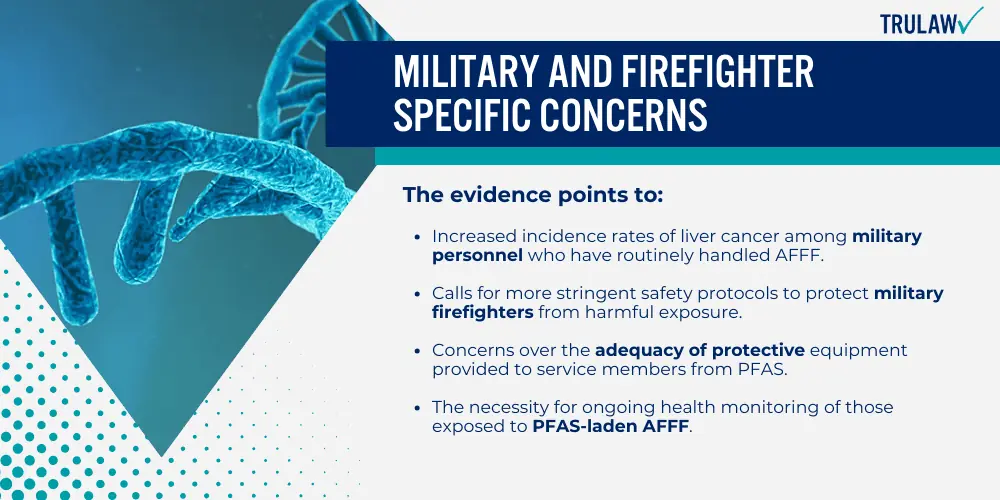
These individuals face unique occupational exposures that may increase their risk of health issues.
Impact on Military Firefighters: AFFF Liver Cancer Lawsuit
Military firefighters have historically used aqueous film-forming foam (AFFF) for fire suppression, which has led to increased occupational exposure to potentially harmful PFAS chemicals.
There have been legal efforts to seek compensation for affected service members in light of the potential health risks.
The evidence points to:
- Increased incidence rates of liver cancer among military personnel who have routinely handled AFFF.
- Calls for more stringent safety protocols to protect military firefighters from harmful exposure.
- Concerns over the adequacy of protective equipment provided to service members from PFAS.
- The necessity for ongoing health monitoring of those exposed to PFAS-laden AFFF.
Firefighter Cancer Registry Act and Studies
The Firefighter Cancer Registry Act seeks to address the prevalent health concerns tied to occupational exposure.
Passed by Congress, the act endeavors to improve data collection to inform future safety measures.
Studies guided by the act have established the following:
- A formal mechanism to track cancer incidence within the firefighting profession is crucial for understanding the impact of AFFF.
- Engagement with the National Cancer Institute to conduct in-depth research into cancer rates among firefighters.
- Provisions that ensure the collection of comprehensive data on the types of fires and the specific chemicals firefighters are exposed to.
- Educational outreach to inform firefighters and military personnel about the dangers associated with firefighting foams and the importance of protective measures.
Frequently Asked Questions
-
What are the criteria for eligibility to participate in the AFFF liver cancer lawsuit?
Individuals who have been diagnosed with liver cancer and have a history of exposure to Aqueous Film Forming Foam (AFFF) may be eligible to participate in the lawsuit.
Specifically, they must prove that they used or came into contact with AFFF during their work or residence near contaminated sites.
-
What is the current status of settlements related to the AFFF lawsuits?
As of the date provided, settlements in AFFF-related lawsuits are ongoing, with various cases at different stages in the litigation process.
Some class action settlements have been proposed, but final resolutions and payouts are subject to court approval.
-
What are the average compensation figures for claimants in AFFF cancer lawsuits?
While compensation amounts can vary extensively based on individual circumstances, average figures typically reflect the severity of illness, length of exposure, and impact on the claimant’s quality of life.
These figures are determined as cases are settled or go to trial.
-
When is the AFFF cancer lawsuit expected to reach a settlement?
The timeline for the AFFF cancer lawsuit to reach a settlement is uncertain and can depend on numerous factors, including court schedules, the number of claimants, and the willingness of the parties to negotiate.
It’s important to monitor ongoing legal proceedings for the most current information.
-
Are members of the Navy among those affected by the AFFF lawsuit?
Yes, Navy members are among those impacted by the AFFF lawsuit.
AFFF has been commonly used during firefighting exercises and emergency responses on naval ships and at military bases, potentially leading to exposure and related health issues.

Experienced Attorney & Legal SaaS CEO
With over 25 years of legal experience, Jessie is an Illinois lawyer, a CPA, and a mother of three. She spent the first decade of her career working as an international tax attorney at Deloitte.
In 2009, Jessie co-founded her own law firm with her husband – which has scaled to over 30 employees since its conception.
In 2016, Jessie founded TruLaw, which allows her to collaborate with attorneys and legal experts across the United States on a daily basis. This hypervaluable network of experts is what enables her to share reliable legal information with her readers!
You can learn more about the AFFF Lawsuit by visiting any of our pages listed below:
Here, at TruLaw, we’re committed to helping victims get the justice they deserve.
Alongside our partner law firms, we have successfully collected over $3 Billion in verdicts and settlements on behalf of injured individuals.
Would you like our help?
At TruLaw, we fiercely combat corporations that endanger individuals’ well-being. If you’ve suffered injuries and believe these well-funded entities should be held accountable, we’re here for you.
With TruLaw, you gain access to successful and seasoned lawyers who maximize your chances of success. Our lawyers invest in you—they do not receive a dime until your lawsuit reaches a successful resolution!
Do you believe you’re entitled to compensation?
Use our Instant Case Evaluator to find out in as little as 60 seconds!
Camp Lejeune’s water contamination issue spanned several decades starting in the 1950s. Exposure to these chemicals has been linked to various serious health issues, including cancer, organ diseases, and death.
Research is increasingly suggesting a link between the use of Tylenol during pregnancy and the development of neurodevelopmental disorders, such as autism and ADHD, in infants.
Legal action is being taken against manufacturers of Aqueous Film-Forming Foam (AFFF), a chemical used in fighting fires. The plaintiffs allege that exposure to the foam caused health issues such as cancer, organ damage, and birth and fertility issues.
Here, at TruLaw, we’re committed to helping victims get the justice they deserve.
Alongside our partner law firms, we have successfully collected over $3 Billion in verdicts and settlements on behalf of injured individuals.
Would you like our help?
